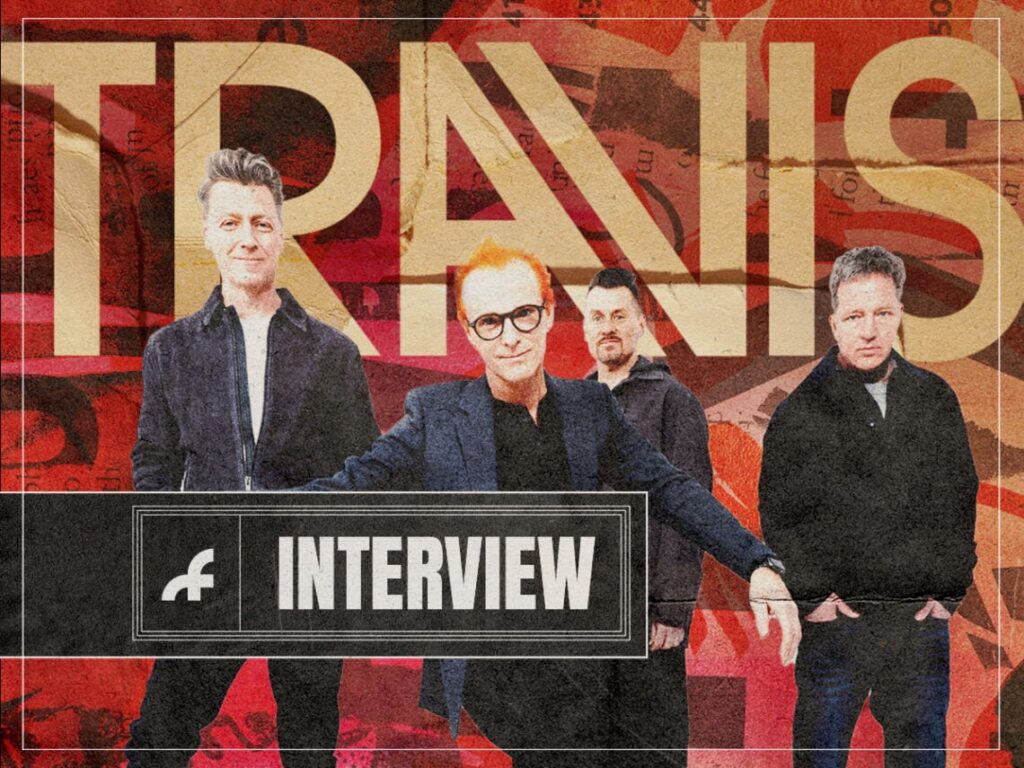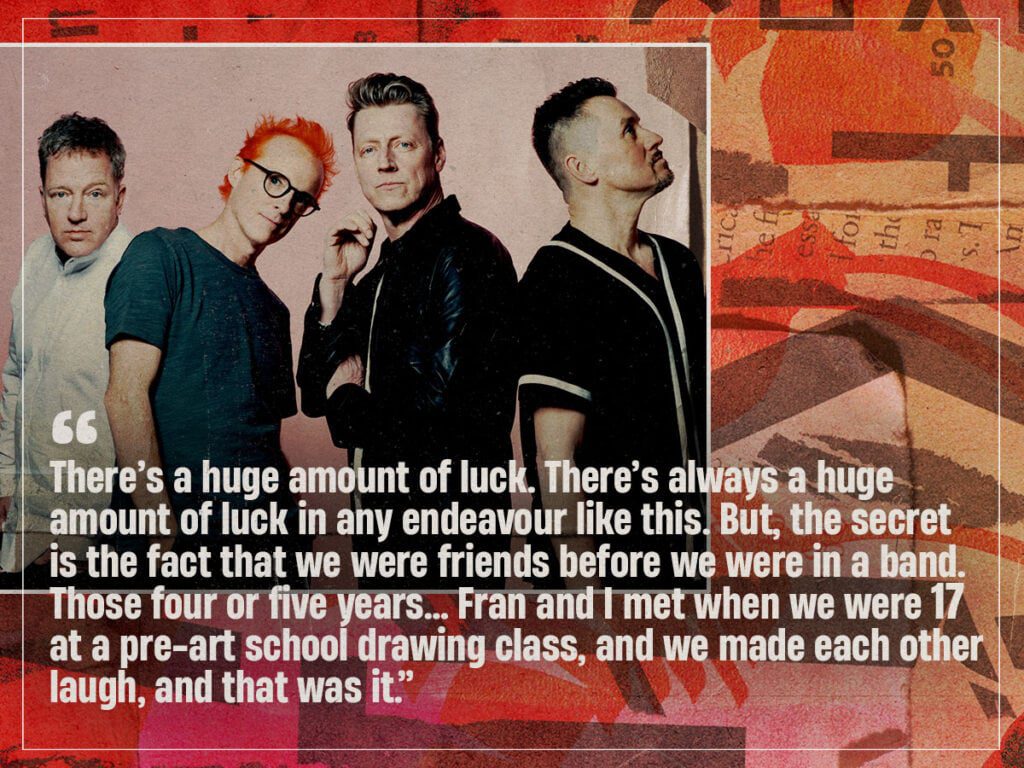“It’s not friendship, it’s not brothers, it’s something else”: 10 albums young with Travis
 Posted On
Posted On
(Credits: Far Out / Steve Gullick)
Dougie Payne’s got the Zoom camera set up down to a tee. None of this unflattering nonsense with the Travis bassist. He sits on a sofa, occasional sips from a cup of something and the London sun creeping through the window behind. He unwinds ahead of their gig supporting The Killers, their second-to-last outing with the band before the tour ends. It’s also two days before the release of their new album: album number ten, L.A. Times.
Travis don’t need an introduction at this point. You might only know them for their hits, or you might be a lifelong fan, but the fact remains that they’ve made enough of a name for themselves to be immediately recognisable and to have new work awaited with wide-eyed anticipation. In a hotel room that connects to the O2 Arena, where the band are set to perform in a few hours, I ask Payne to take me back to their first-ever rehearsal.
“I can remember the smell of the room,” he said, “The band had been going for a few years. The four of us had been pals, but the band had been going as a five-piece called Glass Onion for a few years. Fran [Healy] was like, ‘Something needs to change’, and then he was like, ‘I want you to join the band’.”
Two members of Glass Onion were dropped, and Payne stepped up to be the new bassist, an instrument he wasn’t too familiar with at the time. “This was in April ’96. He gave me a tape with five songs on it… I’d never played bass; I’d played guitar, piano and saxophone, but never bass. He was like, ‘Right, spend a week, learn these songs’. He brought me the tape and a bass. I was like ‘OK’.”
Miles away from the O2 Arena in London, the band set up in a local bar: The Horseshoe. ”A big, old-school Glasgow bar,” Payne recalls. ”Upstairs, they had an empty room that Neil [Primrose] managed to commandeer because he worked behind the bar. He managed to get it for free as a rehearsal space. So, you kind of went up these windy back stairs, past all the beer kegs. The stairwell just stank of stale beer.”
He continued: “I had nothing to compare it to. You know, I’d been in bands in school, but I hadn’t been in this band. So, we struck up ‘All I Wanna Do Is Rock’ as the first song, and I was just concentrating on what I was doing, trying to make sure I’d learnt the song right, but they were all looking at each other going, ‘Oh, this feels amazing’.”

Travis continue to play the song ‘All I Wanna Do Is Rock’, and that feeling is still invoked every time; however, they’re not a band that leans on nostalgia as a means of moving forward. Represented beautifully in their new album, what keeps the band going is a love for exploring new music and creating together. Despite being their tenth album, released 30 years on from the band’s inception, L.A. Times feels like a turning point and a creative expansion, so much so that after recording some of the songs, the same feeling conjured that day in The Horseshoe was back.
“That’s exactly what it feels like…the weird thing is that you’ve hit upon something that we have been talking about within the band, and it’s the fact that the new songs that we’re playing feel like they’ve been in the set forever. They’ve made friends with the old songs really quickly…so, when we started rehearsals like six weeks ago, doing the new stuff was like, ‘Oh, this just feels effortless’.”
L.A. Times does feel like a special outing for the band; the different styles explored on the record are scattered, yet they align in a way that creates something cohesive and profoundly beautiful. Whether that’s in upbeat dance-y numbers such as ‘Gaslight’, slower and more fragile tracks like ‘Live It All Again’, or politically charged left-field experimentations like in ‘L.A. Times’, when Fran is borderline rapping, no songs betray the album or sound out of place—quite the opposite.
So, what’s the secret? A band, 30 years on, who have a string of hits, continue to operate as four loyal brethren, still love touring, and surprise one another with the music they create… it’s every person who picks up a guitar and imagines themselves on stage’s dream. But all too often, it becomes a nightmare—one Travis has kept firmly at bay.
“There’s a huge amount of luck. There’s always a huge amount of luck in any endeavour like this,” explained Payne, “But, the secret, and there is a secret, was something that I touched on earlier. It’s the fact that we were friends before we were in a band, you know? Those four or five years… Fran and I met when we were 17 at a pre-art school drawing class, and we made each other laugh, and that was it… It’s not friendship, it’s not brothers, it’s something else.”
Payne then met Neil, who was working in a shoe shop, and Andy [Dunlop] on his first day of art school. The band formed around that friendship as opposed to being formed around music. It’s rogue to think that there is any specific secret to success, but Payne may well be onto something here. The band revolved around them being mates, not their success or profile. It has meant that over the run of ten albums, which has inevitably come with good times and bad, their friendship keeps them together.
With that security comes the freedom to put forward different ideas, a willingness to go on the road together for elongated periods, and the fun that surrounds playing music for a living. Whether you only know the hits or you know the discography inside out, one fact remains about Travis, and it can be heard as prominently in their new album as it could be heard in 1990: They’re having fun.
[embedded content]
Related Topics


